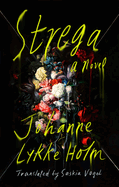
Johanne Lykke Holm's first novel in English, Strega, is a fever dream meditation on girlhood, female friendships and unnamed dangers.
Rafaela is 19 years old when she leaves her parents' home and travels into the mountains to work as a maid at an old hotel, with eight other girls her age. They clean and polish and set tables for every meal; they wash sheets and dress in clean uniforms, but no guests arrive. Lounging together, sharing cigarettes and liqueurs and candies, they are immediately close. Their matronly bosses are strict, even punitive, but their days still feel relaxed and without energy, emphasizing the pointlessness of their work. The hotel was once a shocking red, fading to pink against the forests; the strangely sinister neighboring nuns call it Il Rosso. Rafa calls it "a morgue beneath the trees." When listless summer turns to fall, the hotel throws a party, and one of the nine girls disappears.
The remaining eight girls search for her; her parents appear to claim her possessions; the barren season at the hotel stretches on. In one of Strega's figurative turns, the missing girl--presumed murdered--comes to stand in for female victims of unspecified violence. Holm's prose, translated from the Swedish by Saskia Vogel, is hypnotic, dreamlike and favors repetition in phrasing and images: "Our hands would repeat the same movements... our hands always repeated the same movements." The novel is short and spare, but unwavering in its intensity. Strega is riveting: surreal, ominous, somehow both vague and sharp in its observations about the harms that girls submit to when they become women. --Julia Kastner, librarian and blogger at pagesofjulia

